Why is there so much sexism in sport reporting?
In an interview after the match, Celtic boss and Antrim native Brendan Rodgers was answering questions from sports journalist Jane Lewis.
Mr Rodgers’ behaviour has been described as “demeaning” and there have been calls for him to apologise.
Speaking to Newstalk Breakfast, BBC newsreader and sports reporter Lauren Moore said dealing with sexism was an occupational hazard in her line of work.
“The comment didn’t particularly surprise me… I’m not surprised anymore when these things come out,” she said.
Ms Moore said she had seen it reported online that Mr Rodgers had called a male journalist ‘good man’ but she feels this is not nearly as patronising as calling a woman a ‘good girl’.
“He didn’t say ‘good boy’ to him,” she said.
“Just like he didn’t say ‘good woman’ to the girl - it was undermining, it was a childish way to speak and it was sexist.”
'Are you on work experience?'
Ms Moore has worked in football journalism for six years but she sometimes still feels “self-conscious” at matches when she is one of only a handful of women in the press room.
“I get my own comments either in person or from other people at games,” she said.
“I’ve had [people say], ‘What are you doing here sweetheart? Are you on work experience?’ a lot of the time just because I’m a young woman.
“When comments come at me like that; they can see that I’m different, it’s like I don’t belong here.
“I get spoken over a lot if we have a roundtable when we’re doing interviews; the men tend to respect each other, it feels like, and as soon as I’m about to speak, someone remembers another question.”
Social media can also be difficult to navigate for female sport journalists.
“For me personally, with social media, I think it’s getting a lot worse,” Ms Moore said.
“I get… less sexism in person but a lot on social media; I’ve had to put my comments on limited for the past three months due to constant messaging.”
Career change?
At times, Ms Moore has even considered giving up sport reporting altogether and transferring into news full-time.
“But then I’ve thought, I don’t want to let people drive me out from doing something I love so much at the same time,” she said.
“It has been a bit of a struggle the past six years of being in the sport industry, definitely.”
According to the British National Council for the Training of Journalists, in 2021 just 7% of students on NCTJ sports journalism courses were women.
Main image: Celtic Manager Brendan Rodgers raises a fist in celebration. 25th Feb, 2024. Credit: Action Plus Sports/Alamy Live News. Picture by: Alamy.com









